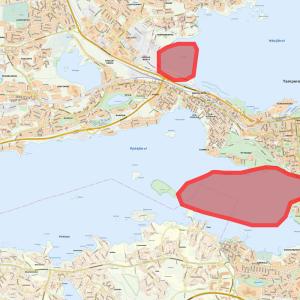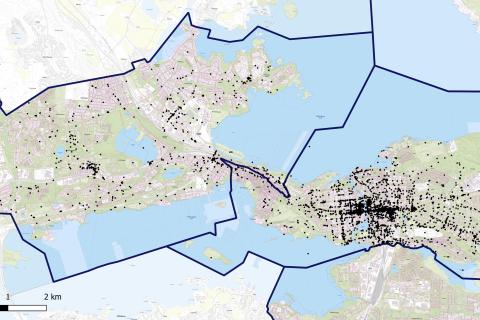Southern Tampere: "The entire Iidesjärvi area, in its current state, brings serenity and joy to life."
Compared to other areas, residents in the south experience less physical threat and are less often subjected to violence or intimidation. However, 18 percent of respondents reported a very weak sense of inclusion. Residents in this area less frequently feel needed by others or that they can influence the course of their own lives compared to other parts of the city.
Traffic is the most significant concern in the south. Respondents expressed worries about the high volume of cars, through traffic, and intersection arrangements—particularly at the eastern end of Hallilantie.
In the south, the beaches, parks and outdoor and fitness facilities of lakes Pyhäjärvi, Iidesjärvi and Peltolammi are valued. Nature is also frequently enjoyed in areas such as Viinikanpuisto and the space between Vähäjärvi and Perkiönpuisto.
Southeastern Tampere: "On the path around Suolijärvi, you feel further away from the city than you are. What a wonderful peace!"
In the southeastern area, survey respondents reported feeling lonely and psychologically stressed more often than the citywide average. On the other hand, residents here are more active in volunteer work and more frequently feel that they can influence the development of their residential area.
Feelings of insecurity have increased especially in the Hervantakeskus area. Insecurity is also experienced near the shopping centers in Annala and Kaukajärvi. There are also places where people feel uncomfortable, such as the surroundings of Ahvenisjärvi, as well as the Isokuusi and Vuoreskeskus areas.
All of the area’s large and small lakes and their surroundings are considered important and cherished outdoor spaces by respondents. Other frequently mentioned places include Pehkusuo, Hikivuorenpuisto, the Haihara area, and Näyttämönpuisto.
Northeastern Tampere: "The surroundings of the Mannerheim’s Rock, a wonderful outdoor and play area!"
In addition to the city centre, the well-being of residents in the northeastern part of the city is above average by many measures. Respondents are satisfied with their living conditions and feel that their neighbourhood is safe and pleasant. Residents also experience less discrimination and are less likely to feel lonely than in other areas. However, there are differences between neighborhoods within the area.
Traffic is clearly the most significant concern in the northeast. Residents are particularly worried about the high volume of cars, driver behavior, and driving speeds on streets such as Messukylänkatu and Aitolahdentie. Respondents marked noticeably fewer unsafe places here than in other parts of the city.
Various green areas, as well as outdoor, fitness, sports, and recreational areas, are especially valued in the northeast. Popular locations include Jankanpuisto, Varsanpuisto, and the Halimasjärvi nature reserve, alongside Mannerheim’s Rock.





